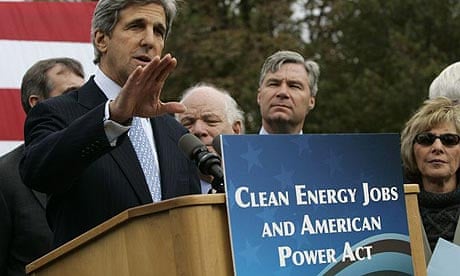US climate sceptic lobbyists' attempts to stop greenhouse gas emissions from being labelled as a pollutant were last week rejected by The US Environmental Protection Agency (EPA).
Climate sceptics and oil and coal lobby groups, including the Peabody Energy Company, had challenged the EPA's ruling from December 2009 that climate change caused by GHG emissions was a threat to public health and the environment. Citing the University of East Anglia 'climategate' controversy they said the science could not be trusted.
The EPA rejected the claims saying they were based on "selectively edited, out-of-context data and manufactured controversy" and that the evidence of climate change was "credible and growing stronger."
"Defenders of the status quo will try to slow our efforts to get America running on clean energy. A better solution would be to join the vast majority of the American people who want to see more green jobs, more clean energy innovation and an end to the oil addiction that pollutes our planet and jeopardises our national security," said EPA administrator Lisa Jackson.
On the matter of the emails between climate scientists taken from the UEA and published online last year, the EPA said: "Petitioners' assumptions and subjective assertions regarding what the e-mails purport to show about the state of climate change science are clearly inadequate pieces of evidence to challenge the voluminous and well documented body of science that is the technical foundation of the Administrator's Endangerment Finding."
Environmental groups welcomed the decision and said the EPA had powers under the Clean Air Act to push ahead with regulating greenhouse gas emissions from sources such as coal-fired power plants and industry.
Under The Clean Air Act the EPA is required to regulate air pollutants in order to protect public health and welfare.
The Centre for Biological Diversity said with the recent failure of congress to pass adequate legislation to reduce emissions the door was open for the Obama administration to use the Clean Air Act.
"We have always believed that the Clean Air Act possesses sufficient tools, and is legally required to be used, to reduce greenhouse gas emissions to a safe level," says executive director Kierán Suckling.
"We urge the Obama administration to make full and effective use of the law while Congress steps back and takes a year to see where it went wrong and makes another go at crafting climate legislation with enough teeth and scientifically established standards to actually stop runaway global warming," he added.
Energy expert and architect of the Kyoto Protocol's carbon market Graciela Chichilnisky said the EPA already had a track record in successfully cutting emissions, having introduced limits on sulphur dioxide emissions through the Acid Rain Program.
"It's in their hands. With presidential power, the EPA can put any carbon limits they wish on stationary sources, in other words all emissions from industry."
She said while nothing was likely to happen until after the mid-term elections in November, she expected the EPA to start limit carbon emissions in early 2011.

Comments (…)
Sign in or create your Guardian account to join the discussion